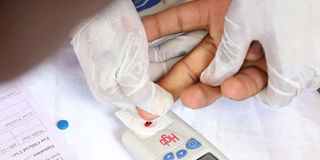New HIV vaccine takes war to virus

HIV/Aids screening test during a past World Aids Day.
What you need to know:
- Antiretroviral therapy (ART), which is a combination of a minimum of at least three ARVs, is a lifelong treatment for HIV infection that prevents the virus from replicating.
- There are nearly 1.6 million Kenyans currently on ART, but the country still has the fourth highest number of Aids infections in the world.
Spanish scientists have come up with a vaccine targetted specifically at HIV-positive people that will prompt their immune systems to fight off the virus on their own, and in turn wean them off antiretroviral drugs (ARVs).
The therapeutic HIV vaccine, expected to be ready in 2024, will redirect the immune response of a person living with HIV so that it attacks the HIV virus effectively.
When a person is infected with HIV, the T-cells (a type of white blood cells) in their bodies respond by attacking the infection, but this reaction only attacks ‘non-vital’ parts of the virus, sparking changes and uncontrolled multiplication of the virus in the body.
But this new vaccine, which hopes to provide a “functional cure” for HIV, may change that.
Ms Cristina Quiles, CEO of Aelix Therapeutics, the Barcelona-based company developing the vaccine, told HealthyNation last week that the vaccine “will teach the immune system to aim at the vulnerable but beneficial regions of HIV so as to conquer them”.
It is the product of a study of nearly 1,000 HIV infected people not on treatment, but who were able to naturally control the virus,” she added. Participants in the study were drawn from three continents.
By slowing down the progression of HIV infection, Ms Quiles, says there “won’t be need for antiretroviral therapy” because the HIV will be “in undetectable levels”, which means the infected person then becomes less likely to transmit HIV to others.
Antiretroviral therapy (ART), which is a combination of a minimum of at least three ARVs, is a lifelong treatment for HIV infection that prevents the virus from replicating. There are nearly 1.6 million Kenyans currently on ART, but the country still has the fourth highest number of Aids infections in the world.
However, according to the World Health Organisation, ARV treatments, though life saving, have also been reported to have long-term toxicity and side-effects on patients, such as fatigue, muscle wasting, fat maldistribution, weak and fragile bones, depression, and nightmares.
RESISTANCE TO ARVS
There is also the likelihood of patients developing resistance to the ARVs, and all these may affect adherence to the drugs.
“This vaccine will reduce the chronic side effects of using ARVs as well as cut down health care costs of providing HIV treatment,” Ms Quiles said.
The news of the vaccine was welcomed by the National Empowerment Network of People living with HIV/Aids in Kenya (Nephak)
The network’s national coordinator, Mr Nelson Otuoma, told HealthyNation that “the world needs an HIV vaccine, we wish it comes earlier”.
The vaccine is seen as a possible foundation for the design of preventive vaccines against HIV as it is engineered to help the immune system prevent an infection.
Further, it is expected to be “more affordable” than decades of antiretroviral treatment. Currently, Kenya spends Sh20,000 to put one person on treatment in a year.
The findings of the vaccine were shared in Berlin, Germany during the just concluded Falling Walls Conference that brought together scientists and researchers to deliberate solutions to global challenges such as HIV/Aids, cancer, radicalisation, and food security.



